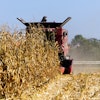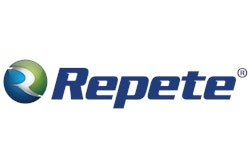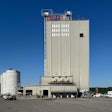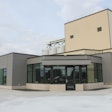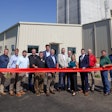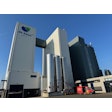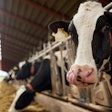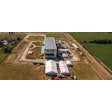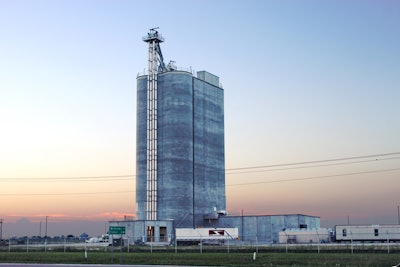
On June 10 Cargill Pork hosted more than 100 attendees for an open house at its newly constructed swine feed mill in Hedrick, IA. The $25 million facility, engineered and built by Younglove Construction LLC, welcomed the public this day to showcase the mill to local farmers.
Equipment List |
|
|---|---|
|
Supplier |
Equipment |
| 4B Components Ltd. | Bearing Sensors |
| Air-Con Corp. | Dust Collection |
| Anderson Crane | Screw Conveyors |
| Andritz Inc. | Hammermills |
| Andritz Inc. | Pellet Mills |
| BinMaster Level Controls | Bin Level Monitors |
| Cleaver Brooks | Boiler |
| Endress+Hauser | Mass Flow Meters |
| Geelen Counterflow | Pellet Cooler |
| Hayes & Stolz Ind. Mfg. Co. Inc. | Distributors |
| Ingersoll Rand | Air Compressor |
| Intersystems | Bucket Elevators |
| Intersystems | Microingredient System |
| Maxi-Lift | Elevator Buckets |
| Maxi-Tronic Inc | Motion Sensors |
| Mettler Toledo | Scales |
| Puritan Magnetics Inc. | Magnets |
| Repete Corp. | Automation System |
| Rice Lake Weighing Systems | Scales |
| Rotex Global LLC | Screeners |
| Schumacher Elevator Co. | Manlift |
| Scott Equipment Co. | Mixer |
| Younglove Construction LLC | Engineer and General Contractor |
Jane Fallon, general manager of Cargill Pork, said that one of the purposes of the event was to show the feed mill to current and prospective contract hog farmers. All of the 350,000 tons of pelleted feed to be produced per year at the mill will be used internally by Cargill Pork at about 100 contract hog farms within a 45-mile radius of the mill. The company hopes to add contract hog farmers in the upcoming years and reduce the area served by the feed mill to about a 35-mile radius.
Cargill chose Hedrick — “the sweet spot” as Fallon called it — as the location for the feed mill for many reasons.
“Not only do we have access to our pork harvesting facility in Ottumwa, IA, but we can also reach our pork harvesting facility in Beardstown, IL,” stated Fallon. “This area is blessed with good crops, we’re at the intersection of two main roads, and we already had a significant amount of contract finishing in the area.”
Younglove began construction in September 2013 and finished the job over the next 18 months. The feed mill officially opened and began running batches on March 30, 2015.
Making bacon
The Hedrick mill is part of a $55 million Cargill investment in Southeastern Iowa. The remaining $30 million was invested about 15 miles south of the Hedrick mill in new bacon capabilities and upgrades in Cargill’s Ottumwa processing plant. Fallon described the feed mill as the foundation that supports Cargill pork products.
“I think quality meat starts with quality feed,” Fallon said. “That’s certainly why Cargill went down this journey of adding another feed mill. Our ultimate customer is the pork harvesting facilities where our hogs go. The quality of that belly for cutting bacon, the yield in terms of cuts at the plant is really our final determinant.”
The vertical operation of Cargill Pork means feed milling operators share a sense of responsibility for customer satisfaction with the growers.
“We’re looking at not only the efficient running of the mill, but we’re also looking at delivering the highest quality feed to our own hogs,” said Fallon. “The mill shares a sense of ownership, and if somebody in the mill wants to know how the feed is performing at the trough, they could be on one of our contract hog farms within five minutes.”
Mill characteristics
Cargill’s Hedrick mill produces 100% pelleted feed using two pellet mills rated at 80 tons/hour, which Fallon says allows for greater feed conversion and allows the mill to utilize difficult-to-handle ingredients.
The process starts at incoming grain. Grain trucks pull up onto a Rice Lake Weighing Systems scale where loads are probed, tested and graded and then dumped into two 10,000-bushel-hour receiving pits.
Whole corn is stored in the mill’s two 30-foot-diameter, 163-foot-tall corn silos. The mill also contains one interstice bin for a total of 167,000 bushels of storage capacity. From storage, the corn goes to two 250-hp Andritz hammermills for grinding.
All other ingredients are batched automatically and mixed in a 6-ton twin shaft Scott mixer with 120-ton/hour capacity. The mill provides the flexibility to produce a variety of different feed diets thanks to 23 overhead ingredient bins that hold up to 1,600 tons each, and an Intersystems 24-bin microingredient system.
Feed is mixed approximately three minutes per batch, and after pelleting using steam from a Cleaver Brooks boiler, the pellets go through a Geelen Counterflow cooler.
It takes about five minutes to load finished feed into trucks — to the tune of 50 loads/day —through 16 load out bins with a total storage capacity of 1,400 tons of finished feed. The Hedrick mill operates a fleet of six delivery trucks.
Currently, the mill runs 14 hours a day, but Mike Sodak, feed mill manager, has plans to ramp up operations to 24 hours round the clock. The increased production will bring total mill staff to 15 hourly employees, not including support staff.
Safety from the Foundation
Safety is of utmost importance at Cargill across all divisions at every step, starting with facility construction. Bradly Marecek oversaw the construction safety of Cargill’s 350,000-ton/year swine feed mill in Hedrick, IA. Crews logged more than 200,000 hours completing the facility, and finished with only two recorded safety instances during that time. Neither was a lost-time injury, a feat that Marecek doesn’t take lightly.
To avoid potential incidents, Cargill’s construction safety teams instill a culture of safety through a variety of tactics, including “safety cards” and a behavior/hazard recognition program where all employees on-site are engaged in seeking out, finding and eliminating hazards. Marecek collected close to 1,000 cards while on the Hedrick job, equaling three to four cards per day.
“That means somebody thought and wrote down ‘We need to have a better way of hanging extension cords’ or ‘Let’s improve an electrical procedure inside the mill,’” said Jane Fallon, general manager of Cargill Pork.
Each concern is addressed and communicated with the construction crew, bringing a solution full circle to the employee who identified the hazard.
“Safety doesn’t have to be about complicated paperwork,” Fallon said. “Simply getting input from everybody on the jobsite is probably the best way to achieve results.”
Marecek added, “We focus more on the intent of the safety program versus just going through the compliance motions. We don’t want to say ‘We have to complete this paperwork’; it’s rather ‘Why do we have this paperwork in place?’”
Asking this question, according to Fallon, helps them, “really understand there is a safe way to do things. I think instilling that culture was important at construction and when you have that foundation, it’s easier to roll it through the operational side when you’re running the mill.”
Since feed production began on March 30, the mill has not recorded any lost time due to injuries.
JBS to Acquire Cargill Pork
On July 1, JBS USA Pork entered into an agreement to acquire Cargill’s U.S.-based pork business for $1.45 billion, with completion of the transaction being subject to regulatory review and approval.
The acquisition would include the Hedrick feed mill and four others: two in Missouri, one in Arkansas and one in Texas; four hog farms: two in Arkansas and one each in Oklahoma and Texas; the nearby Ottumwa, IA, processing plant and the Beardstown, IL, processing plant. Both plants were acquired by Cargill in 1987, and in 2014 the company processed a total of 9.3 million hogs.
JBS has been increasing its footprint in the U.S. pork market since 2007 with the acquisition of Swift & Company. With more than 6,000 employees, JBS has the total daily capacity to process more than 50,000 hogs at facilities in Marshalltown, IA, Worthington, MN, and Louisville, KY.
In a press release, Martin Dooley, president and COO of JBS USA Pork, said, “This transaction will strengthen our position as a producer and supplier of all major animal proteins around the world, and provide increased opportunities for our producer partners and key customers. The strength and success of Cargill’s pork team and hog suppliers, as well as its industry leadership in areas such as animal welfare, exports, bacon production and innovation, were significant and compelling factors that led us to pursue this acquisition and enhance our ability to serve our diverse, global customer base.”


